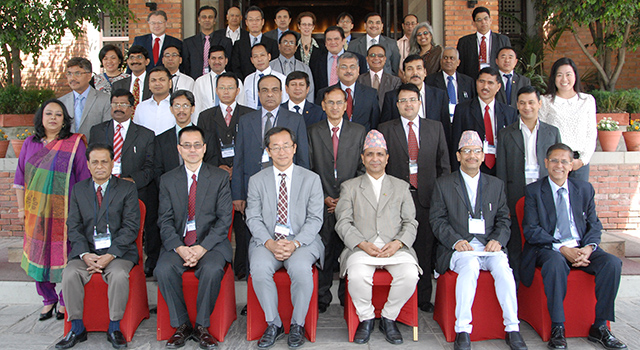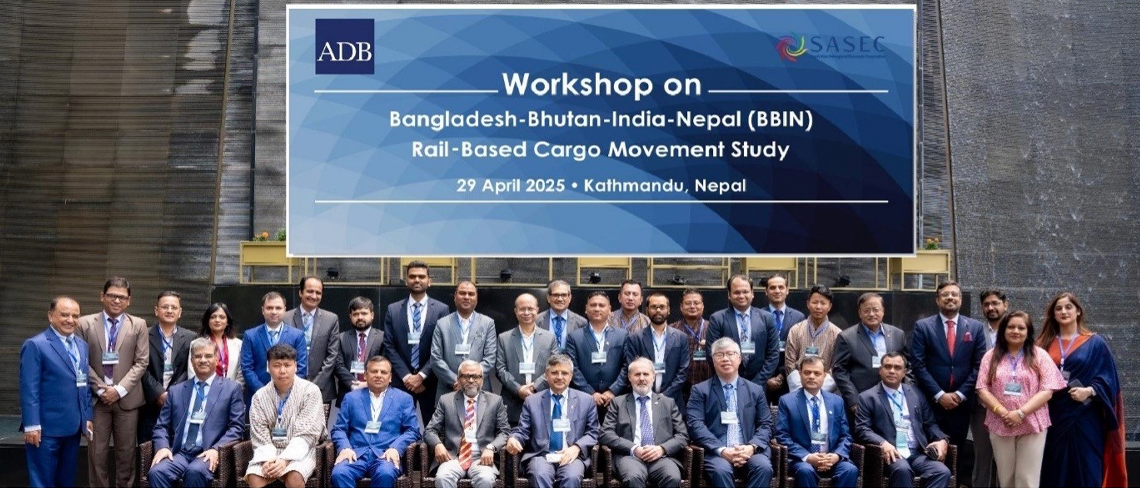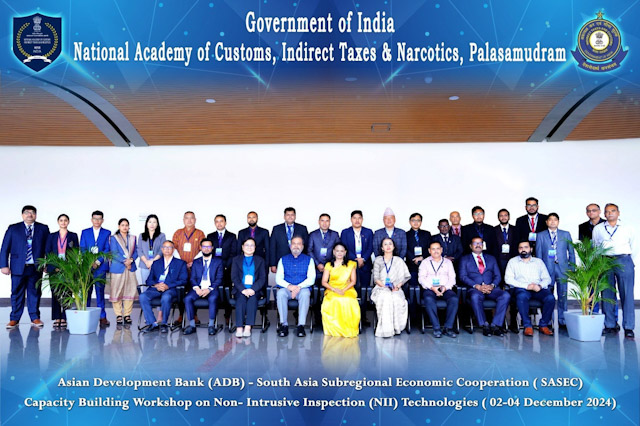
Second Meeting of the SASEC Customs Subgroup (SCS-2)
22-23 May 2014

The Second Meeting of the SASEC Customs Subgroup (SCS-2) was held on 22–23 May 2014 in Kathmandu, Nepal. The concrete outcomes of the Meeting were
- endorsement of the SCS Work Plan 2014-2015, aligned with the customs-related strategic thrusts of the SASEC Trade Facilitation Strategic Framework (TFSF);
- identification of subregional capacity building priorities;
- agreement for ADB to carry out a study on the electronic exchange of trade data between and among SASEC countries.
Work Plan 2014-2015
The Meeting broadly endorsed the projects and initiatives in the Work Plan 2014-2015, following endorsement by the SASEC countries last March 2014 of the SASEC Trade Facilitation Strategic Framework (TFSF) 2014-2018.
SASEC countries proposed projects and activities for inclusion in the Work Plan based on their respective ongoing customs reforms initiatives and in areas that could benefit more from a regional approach.
The Work Plan endorsed by the Subgroup consists of seven subregional projects and 20 national projects that would translate the strategic thrusts in the SASEC Trade Facilitation Strategic framework (TFSF) into concrete outputs and outcomes. The TFSF identifies customs modernization and harmonization as one of the five priority areas of the TFSF guided by the following strategic thrusts: (i) simplifying and expediting border formalities to facilitate movement of goods, vehicles and people; (ii) increasing application of ICT processing; and (iii) developing the National Single Window (NSW) system to link all border agencies with the trading community
The subregional projects in the Work Plan include:
- Exchange of information on standard operating procedures (SOPs) and SAFE Framework of Standards at selected SASEC customs ports and stations;
- Exchange of documents (import/export declarations) at major border crossing points (within the framework of the South Asian Association for Regional Cooperation [SAARC] Mutual Assistance Agreement);
- Assessment of the readiness of regulatory framework and infrastructure facilities in SASEC countries for containerized movement of cargo through land borders;
- Institute regular border meetings between/among the Customs authorities at major border crossing points;
- Implementation of the SASEC Trade and Transport Facilitation Monitoring Mechanism;
- Automation of transit process — use of ICT in processing of transit cargo for enhanced efficiency; and
- Electronic exchange of trade-related information (within the framework of the SAARC Mutual Assistance Agreement).
Subregional Capacity Building Priorities
Priority subregional capacity building activities identified by the SCS to support the Work Plan include Customs valuation and database; risk assessment; nomenclature for trusted trade program; national single window; international standards and conventions (including the Revised Kyoto Convention); and post clearance audit. These areas match the training needs identified by the SASEC countries and are also consistent with the training needs survey conducted by the World Customs Organizations (WCO). ADB and the WCO will collaborate with the SASEC countries in implementing the capacity building activities. India has also offered to share its expertise and experience in the areas of customs valuation and risk management under a South-South modality.
Electronic Exchange of Trade Data
The Meeting brainstormed on a proposed study on electronic exchange of trade-related information. The project would enable the efficient exchange of trade data; better focus on enforcement and compliance issues, smooth movement of cargo, greater certainty and reduced clearance time and cost for compliant traders; and reconciliation of trade data. The SASEC countries agreed to pursue further the development of the concept paper to be considered at the next meeting of the SCS.
The Chief Guest, Mr. Yuba Raj Bhusal, Secretary of the Ministry of Finance of Nepal, opened the Meeting and delivered the keynote address. The heads of delegations of the SASEC member countries highlighted their respective Customs modernization programs and stressed the importance of enhanced cooperation in Customs. The Meeting was chaired by Mr. Surya Prasad Acharya, Director General, Department of Customs, Ministry of Finance, Nepal, assisted by Mr. Kenichi Yokoyama, Country Director of ADB’s Resident Mission in Nepal, and attended by representatives from the customs authorities of the SASEC countries, the Regional Office for Capacity Building for Asia and the Pacific of the World Customs Organization (WCO) and the Government of Japan. Representatives from Japan International Cooperation Agency and the South Asian Association for Regional Cooperation attended as observers.
Knowledge Sharing Workshop on ICT Applications for Customs
A knowledge sharing event was held on 23 May following the Meeting of the Customs Subgroup to share expertise and experience on ICT Applications for Customs, in line with one of the strategic thrusts for customs in the TFSF. Resource Persons included:
- Mr. Theo Hesselink, Officer, WCO, who highlighted the central role of customs in implementing the WTO Agreement on Trade Facilitation launched in December 2013, and the instruments and facilities being provided by the WCO to member countries;
- Mr. Dennis Pantastico, ASEAN Single Window Lead, who provided useful insights on lessons learned from the ASEAN experience on single window in terms of institutional arrangements, technical approaches, legal requisites and data governance;
- Mr. Gopal Jha, Deputy Director, DG Systems, Central Board of Excise and Customs, Government of India, who shared the features of the Indian system, more specifically on multiple applications and inter-linkages between applications; integration with stakeholders, and infrastructure support that included business continuity and disaster recovery; and
- Mr. Masaki Shimakage, Director for Tariff Policy and Legal Affairs, Japan Customs and Tariff Bureau, who described the Nippon Automated Cargo and Port Consolidated System as a good example of public private partnership in delivering a comprehensive and high value-added automated trade logistics information platform that has achieved significant benefits for traders as well as government agencies in Japan.
The Knowledge Sharing Workshop was attended by representatives of customs authorities of the SASEC countries, the Regional Office for Capacity Building for Asia and the Pacific of the WCO and the Government of Japan. Mr. Surya Prasad Acharya, Director General, Department of Customs, Ministry of Finance, Nepal chaired the workshop. Representatives from Japan International Cooperation Agency and the South Asian Association for Regional Cooperation attended as observers.










